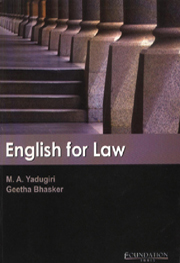Book contents
- Frontmatter
- Preface
- Contents
- A Note to the Student
- Notes to the Teacher
- 1 Nature of Law
- 2 Crimes and Civil Wrongs
- 3 Command of Language in the Profession of the Law
- 4 Plain Language and the Law
- 5 The Indian Constitution
- 6 The Impact of Technology on the Practice of Law
- 7 The International Court of Justice
- 8 Application of Precedents
- 9 Statutory Interpretation
- 10 Legal Reasoning
- 11 Plaints and Writs
- 12 Judgment
- 13 Of Defamation
- 14 Consumer Protection (Amendment) Act, 1993
- 15 The Information Technology Act, 2000
- 16 Universal Declaration of Human Rights
- Answer Key
3 - Command of Language in the Profession of the Law
Published online by Cambridge University Press: 26 October 2011
- Frontmatter
- Preface
- Contents
- A Note to the Student
- Notes to the Teacher
- 1 Nature of Law
- 2 Crimes and Civil Wrongs
- 3 Command of Language in the Profession of the Law
- 4 Plain Language and the Law
- 5 The Indian Constitution
- 6 The Impact of Technology on the Practice of Law
- 7 The International Court of Justice
- 8 Application of Precedents
- 9 Statutory Interpretation
- 10 Legal Reasoning
- 11 Plaints and Writs
- 12 Judgment
- 13 Of Defamation
- 14 Consumer Protection (Amendment) Act, 1993
- 15 The Information Technology Act, 2000
- 16 Universal Declaration of Human Rights
- Answer Key
Summary
The tools of trade
To succeed in the profession of the law, you must seek to cultivate command of language. Words are the lawyer's tools of trade. When you are called upon to address a judge, it is your words which count most. It is by them that you will hope to persuade the judge of the Tightness of your cause. When you have to interpret a section in a Statute or a paragraph in a Regulation, you have to study the very words. You have to discover the meaningly analysing the words – one by one – to the very last syllable. When you have to draw up a will or a contract, you have to choose your words well. You have to look into the future – envisage all the contingencies that may come to pass – and then use words to provide for them. On the words you use, your client's future may depend.
The reason why words are so important is because words are the vehicle of thought. When you are working out a problem on your own – at your desk or walking home – you think in words, not in symbols or numbers. When you are advising your client – in writing or by word of mouth – you must use words. There is no other means available. To do it convincingly, do it simply and clearly.
- Type
- Chapter
- Information
- English for Law , pp. 60 - 92Publisher: Foundation BooksPrint publication year: 2005

